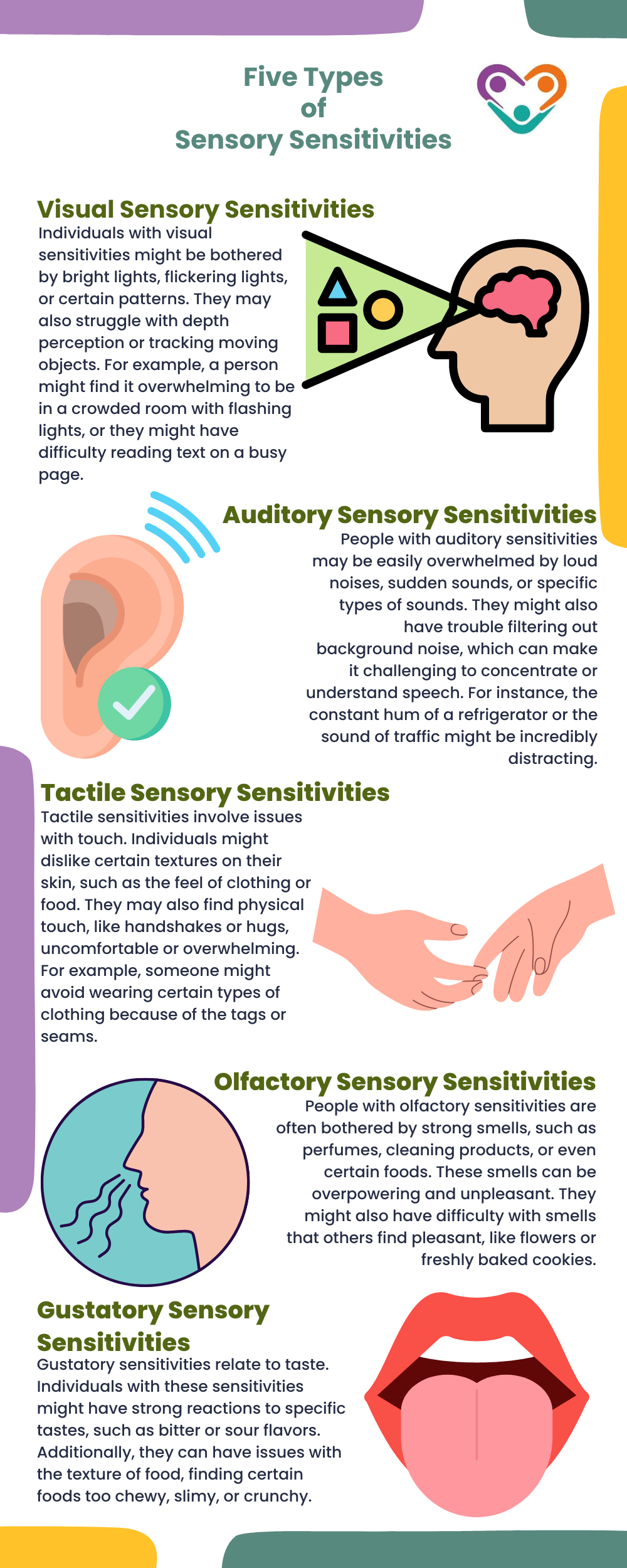Autism Spectrum Disorder (ASD) often involves sensory sensitivities. This means that everyday sensations like sounds, lights, or textures can feel overwhelming or uncomfortable for autistic individuals. Let’s explore what this means.
How Sensory Sensitivities Affect Autistic People
Autistic individuals often perceive the world differently due to unique ways of processing sensory information. While most people find everyday sensations manageable, they can be overwhelming for autistic individuals. For instance, the gentle hum of a refrigerator might be a painful distraction, and the bustling noise of a restaurant can trigger anxiety.
Sensory sensitivities can vary widely. Some autistic people might be hypersensitive, experiencing sensations intensely. Others might be hyposensitive, seeking out sensory input to feel grounded. These sensitivities can fluctuate based on factors like environment, mood, and overall well-being.
Beyond physical discomfort, sensory sensitivities can significantly impact social interactions. For example, avoiding eye contact might be a strategy to manage sensory overload caused by the intensity of another person’s gaze. Difficulty tolerating physical touch due to heightened sensitivity can affect relationships and social connections.

Sensory Processing Differences and Their Impact
Sensory processing differences in autism can manifest in various ways, impacting daily life and social interactions. These differences can range from hypersensitivity, where individuals experience sensory input as overwhelming, to hyposensitivity, where individuals seek out sensory stimulation.
- Hypersensitivity: Autistic individuals with hypersensitivity might experience intense reactions to sensory stimuli. For example, loud noises, bright lights, or certain textures can cause significant distress or discomfort. This heightened sensitivity can lead to avoidance behaviors, anxiety, and challenges in everyday situations.
- Hyposensitivity: On the other end of the spectrum, individuals with hyposensitivity might seek out sensory input to regulate their sensory systems. They may engage in activities like spinning, jumping, or making repetitive sounds. While this behavior might seem unusual to others, it’s often a way for them to self-regulate.
- Sensory Seeking: Some autistic individuals engage in sensory-seeking behaviors, actively searching for specific sensory experiences. This can involve seeking out visual stimuli, sounds, or textures. It’s essential to differentiate between sensory seeking and sensory overload, as both can be challenging but require different approaches.
Different Types of Sensory Sensitivities
There are five main types of sensory sensitivities that can affect people with ASD. Not everyone with autism experiences all kinds of sensitivities. Some individuals may have only one or two, while others might have several.

Sensory Sensitivities in the Workplace
The workplace can present significant challenges for individuals with autism due to their heightened sensitivity to sensory stimuli. These sensitivities, often encompassing sound, light, touch, and smell, can significantly impact an autistic person’s ability to navigate and succeed in a professional environment.
The Impact of Sensory Overload on Professional Lives
For autistic individuals, ordinary workplace sounds like phone ringing, conversations, or office equipment can be overwhelming. Harsh lighting, common in many offices, can cause discomfort and even pain. Strong odors from perfumes, cleaning products, or nearby food areas can be intensely distressing.
Even the feel of certain fabrics or the pressure of clothing can be physically uncomfortable. These sensory overloads can lead to increased stress, anxiety, and difficulty concentrating, hindering productivity and job performance.
It’s essential to recognize that these sensitivities aren’t simply preferences; they are neurological differences that significantly impact daily life. For employers and colleagues, understanding and accommodating these sensory challenges is crucial for creating an inclusive and supportive workplace.
Creating a Sensory-Friendly Workplace
Designing a sensory-friendly workspace is essential for fostering a comfortable and productive environment for autistic employees. Several strategies can be implemented to mitigate sensory overload:
- Noise Reduction: Implementing soundproofing materials, providing quiet zones or private offices, and encouraging noise-conscious behavior can significantly reduce auditory distractions.
- Lighting Control: Offering adjustable lighting options, using warmer light bulbs, and minimizing glare can create a less visually stimulating environment.
- Odor Management: Enforcing scent-free policies, using fragrance-free cleaning products, and designating specific scent-free areas can help reduce olfactory discomfort.
- Tactile Considerations: Allowing flexible dress codes, providing sensory tools like fidget toys, and creating touch-friendly workstations can help manage tactile sensitivities.
- Visual Organization: Keeping workspaces clean and organized, using clear labeling, and providing visual aids can reduce visual clutter and overwhelm.
- Sensory Breaks: Designating quiet, low-stimulation areas for short breaks can help individuals recharge and refocus.
Beyond physical accommodations, creating a supportive work culture is equally important. This involves providing education and training to employees about autism and sensory sensitivities. Encouraging open communication about sensory needs and offering flexibility in work arrangements can also make a significant difference.
The Benefits of a Sensory-Friendly Workplace
Investing in a sensory-friendly workplace not only benefits autistic employees but also the entire organization. When employees feel comfortable and supported, productivity increases and employee turnover decreases. Moreover, a workplace that accommodates individuals with disabilities demonstrates a commitment to inclusion.
If you’re looking for top-notch ABA therapy services to support your child’s development, consider Golden Care. Our team of experienced ABA therapists in NYC, Indiana, New Jersey, Georgia, and Florida provides personalized and effective care. We focus on building essential life skills and enhancing social interactions.
Contact us today to learn more about how Golden Care can make a difference in your child’s life!



